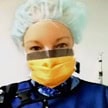-
Asked by Chris to Jonathan, Kellie, Kevin, Melissa, Stephanie on 2 May 2016.0
Question: How many times have you heard someone make a scientific statement and you feel the urge to correct them?
- Keywords:
-
Melissa Wilson Sayres answered on 2 May 2016:
All the time. Sometimes I do, sometimes I don’t. I think it’s in our nature to want the truth to be known, so when we hear something that isn’t correct, can want to change that.
-
Kevin Baker answered on 2 May 2016:
Hey Chris!
Literally every day on Facebook I run into something incorrect. I do feel it is important to correct scientific inaccuracies because they can spread fast. I am not mean about it or anything, so I usually approach it as a discussion. It is important to be polite and courteous. I also view it as I might not change the original poster’s opinion, but I might make a casual reader of the post think about how it is wrong.
-
Jonathan Jackson answered on 2 May 2016:
As Melissa and Kevin say, this happens at least once a day. People often say very inaccurate things about the brain (like people are left-brained or right-brained, or that we only use 10% of our brains) that have a very small grain of truth but are mostly wrong.
Sometimes it is easy to offer more accurate or truthful information, but other times people do not wish to know the truth, because sometimes the real science is much harder to understand. This is why all of us in the Helium and Soil Zones think it’s so important to share science with as many people as possible. When we do, it makes it easier to have discussions about difficult or complicated topics.
-
Stephanie Moon answered on 3 May 2016:
Hi Chris,
It happens sometimes, but instead of correcting people I try to ask them why they think what they think, and see if there is evidence supporting their argument. I think it’s important to remember that sometimes what we think of as facts now are not necessarily the truth- but are an interpretation of evidence or data from experiments (sometimes). Maybe we’ll figure something else out in 10 years that will be a totally different interpretation using new evidence. It’s better to keep an open mind and try to figure out the truth than to rely on facts, and like Kevin said it’s always good to be polite and courteous. -
Kellie Jaremko answered on 3 May 2016:
I agree with all the other scientists. Unfortunately this happens all the time: on the internet, tv. or when patients come in after googling their symptoms. If someone is asking for advice I will carefully try and correct them in a way that doesn’t make them feel bad.
The only time I really really want to correct a stranger is at the zoo when parents tell their curious children the wrong animal that they are looking at. If its a leopard and not a tiger I struggle to not speak up.






Comments